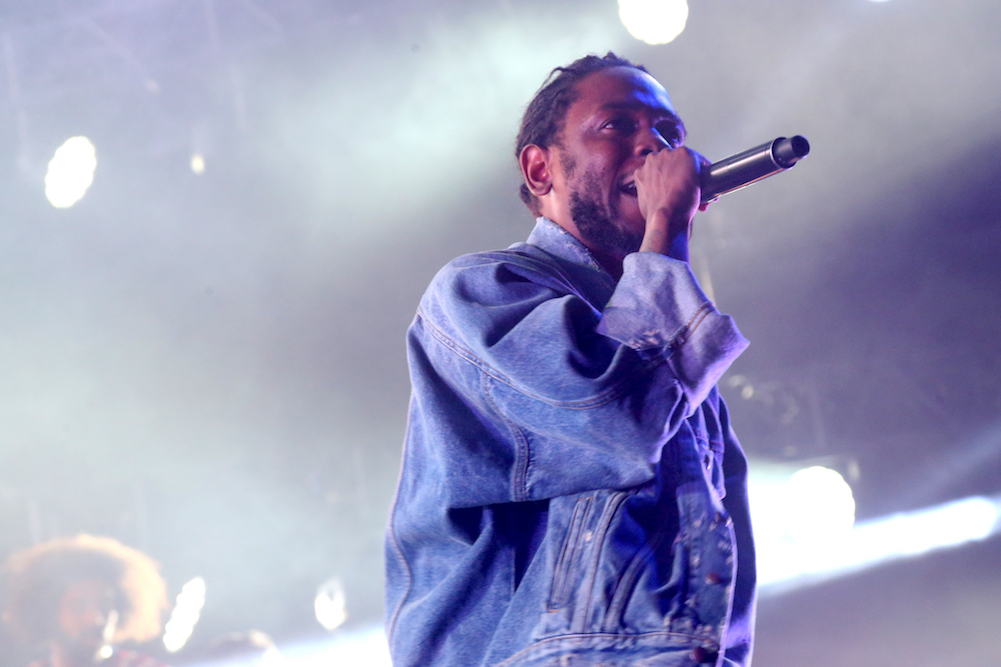Rolling Stone published the rare post-DAMN. Kendrick Lamar interview earlier today. The lengthy talk isn’t only notable for the breadth of topics it covers; it’s one of the few times where the interviewer challenges the borderline sacrosanct star. The writer, Brian Hiatt, presses Lamar on whether his appearance on the “Bad Blood” remix is him taking sides on the Swift vs. Perry beef (“I wasn’t aware of that, bro,” he contends), if he really believes that black people are cursed by God as the Book of Deuteronomy that he cites on DAMN. says (“You take it how you wanna take it.”), and what’s his favorite Drake song (he defers). Below are some of the interview’s highlights.
Lamar gives his opinions on ghostwriting in hip-hop. You could stretch and say that he’s elbowing Drake, but it’s a shot at him in the way any comment about ghostwriting can be:
Is it ever OK for a rapper to have a ghostwriter? You’ve obviously written verses for Dr. Dre yourself.
It depends on what arena you’re putting yourself in. I called myself the best rapper. I cannot call myself the best rapper if I have a ghostwriter. If you’re saying you’re a different type of artist and you don’t really care about the art form of being the best rapper, then so be it. Make great music. But the title, it won’t be there.
Lamar ends “ELEMENT.” by proclaiming, “it’s a difference between black artists and wack artists.” But what exactly is a wack artist?
I love that question. How would I define a wack artist? A wack artist uses other people’s music for their approval. We’re talking about someone that is scared to make their own voice, chases somebody else’s success and their thing, but runs away from their own thing. That’s what keeps the game watered-down. Everybody’s not going to be able to be a Kendrick Lamar. I’m not telling you to rap like me. Be you. Simple as that. I watch a lot of good artists go down like that because you’re so focused on what numbers this guy has done, and it dampers your own creativity. Which ultimately dampers the listener, because at the end of the day, it’s not for us. It’s for the person driving to their 9-to-5 that don’t feel like they wanna go to work that morning.
What’s with DAMN. being less jazzy?
How consciously were you trying to make “DAMN.” a more accessible album than “Butterfly”?
The initial goal was to make a hybrid of my first two commercial albums. That was our total focus, how to do that sonically, lyrically, through melody – and it came out exactly how I heard it in my head. … It’s all pieces of me. My musicality has been driving me since I was four years old. It’s just pieces of me, man, and how I execute it is the ultimate challenge. Going from To Pimp a Butterfly to DAMN., that shit could have crashed and burned if it wasn’t executed right. So I had to be real careful on my subject matter and how I weave in and out of the topics, where it still organically feels like me.
Lamar breaks out his falsetto on Travis Scott‘s “Goosebumps.” Surely that will become more of a thing, right?
Do you have songs that we’ve never heard that are just singing?
Straight melody-driven, for sure. Ultimately, that’s practice for me on my rap albums. I write a lot of the melodies. Shit, usually 95 percent. May jump in and jump out. Might give you a hook like “ELEMENT.” Might give you a verse on a Travis Scott record with the “ghetto falsetto.” That’s what I call it [laughs]. That’s just me flirting with the idea of being able to take it there.Your falsetto sounds a bit like Curtis Mayfield’s. Are you a fan?
Definitely. That was my father’s favorite. My mother’s favorite, actually.
Read the interview in its entirety over at Rolling Stone.





